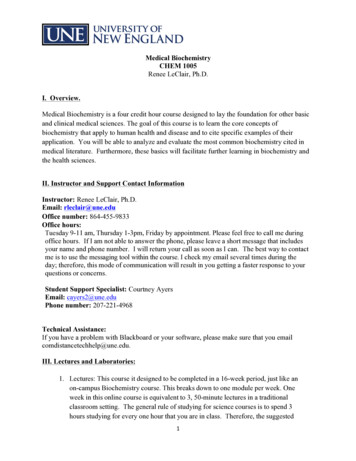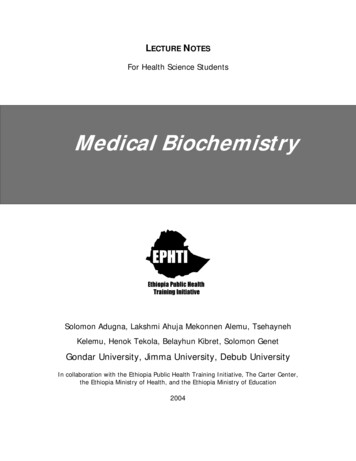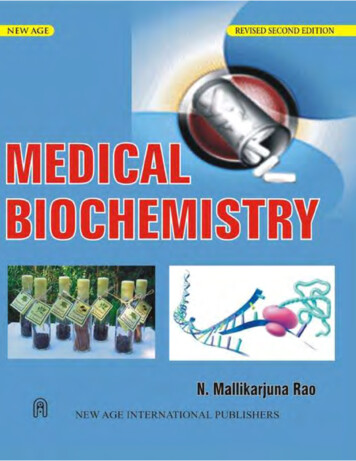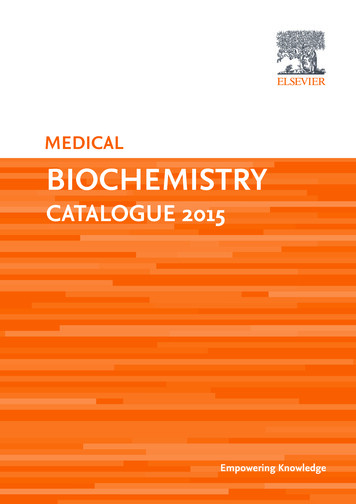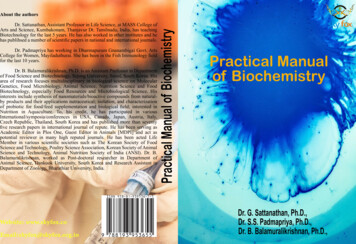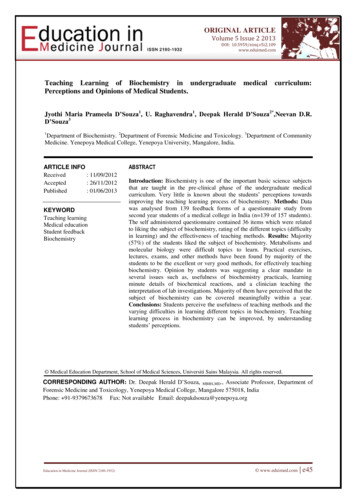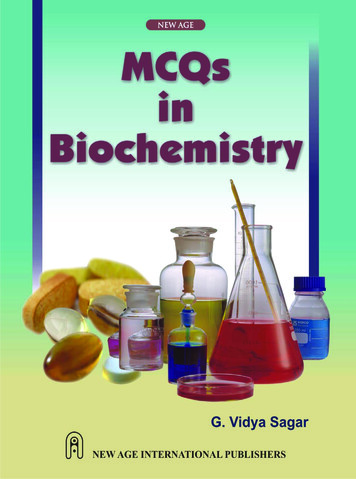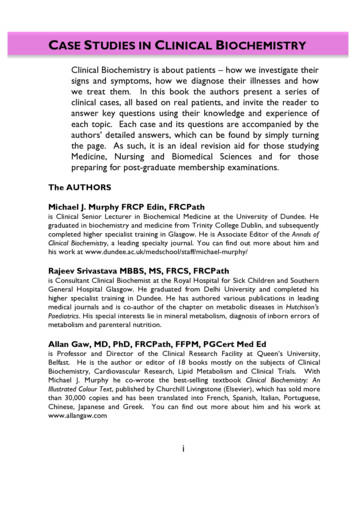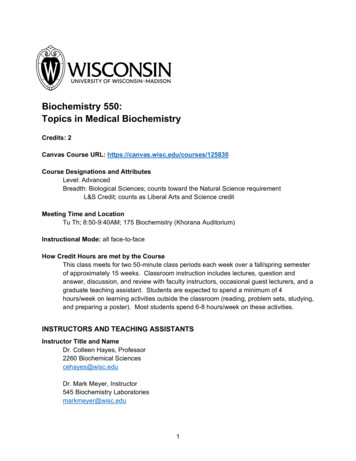
Transcription
Biochemistry 550:Topics in Medical BiochemistryCredits: 2Canvas Course URL: https://canvas.wisc.edu/courses/125830Course Designations and AttributesLevel: AdvancedBreadth: Biological Sciences; counts toward the Natural Science requirementL&S Credit; counts as Liberal Arts and Science creditMeeting Time and LocationTu Th; 8:50-9:40AM; 175 Biochemistry (Khorana Auditorium)Instructional Mode: all face-to-faceHow Credit Hours are met by the CourseThis class meets for two 50-minute class periods each week over a fall/spring semesterof approximately 15 weeks. Classroom instruction includes lectures, question andanswer, discussion, and review with faculty instructors, occasional guest lecturers, and agraduate teaching assistant. Students are expected to spend a minimum of 4hours/week on learning activities outside the classroom (reading, problem sets, studying,and preparing a poster). Most students spend 6-8 hours/week on these activities.INSTRUCTORS AND TEACHING ASSISTANTSInstructor Title and NameDr. Colleen Hayes, Professor2260 Biochemical Sciencescehayes@wisc.eduDr. Mark Meyer, Instructor545 Biochemistry Laboratoriesmarkmeyer@wisc.edu1
Instructor AvailabilityRecognizing that specific office hours may not accommodate students who have otherobligations during those times, and that the staff are actively engaged in research, thestaff will be available for student consultations by appointmentInstructor Email/Preferred ContactPlease contact the instructors by e-mailTeaching AssistantMs. Delia Scoville, Teaching Assistant435 Biochemistry Laboratoriesdscoville@wisc.eduTA Office HoursBy appointmentTA Email/Preferred ContactPlease contact the TA by e-mailOFFICIAL COURSE DESCRIPTIONCourse DescriptionLectures. Biochemical and molecular analysis of selected human diseases. Topics willinclude lipid metabolism and atherosclerosis, cell cycle regulation and oncogene functionin cancer, and human immunodeficiency virus (HIV) structure, life cycle, and mechanismof acquired immunodeficiency disease syndrome (AIDS).RequisitesStudents must complete Biochemistry 501 or Biochemistry 507 (or the equivalent) beforeenrolling in Biochemistry 550LEARNING OUTCOMESCourse Learning Outcomes: students who complete this course will be able to: Apply the scientific method to generate new mechanistic knowledge Distinguish between correlated observations and a true chain of causal relationships Describe basic biochemical mechanisms underlying these diseases: cancer, HIV-AIDS,cardiovascular disease, metabolic syndrome, type-2 diabetes Identify at least one significant unanswered question that constitutes the researchfrontier and informs the research agenda for these diseases Read and understand reviews and original research papers in these disease areas Interpret published data in these disease areas Collaborate with others in small working groups Prepare a scientific poster2
Develop scientific problem solving skills to deploy in the future workplaceGRADING 25% Cancer exam (10 lectures)20% HIV exam (7 lectures)15% Cardiovascular disease, metabolic syndrome, diabetes exam (5 lectures)20% Problems (8 sets)20% Poster ProjectPoint totals out of 100 points will be fitted to a curveIn the past 5 years, the class means were 84, 84, 85, 84, and 86%Students with scores clustering near the mean will be awarded a BStudents with scores significantly above the mean will be awarded an A; typically thesestudents comprise 20-25% of the classStudents with scores significantly below the mean will be awarded a C; typically thesestudents comprise 5-10% of the classStudents with scores very significantly below the mean will be awarded a letter grade ofD or F; this is very rare (2/250 students between 2013 and 2017)DISCUSSION SESSIONSThe TA will conduct a discussion session before each examLABORATORY SESSIONSDoes not applyREQUIRED TEXTBOOK, SOFTWARE & OTHER COURSE MATERIALS No textbook is required; PDF files of reading assignments (scientific research papersand reviews) will be available for download from the course website.Microsoft Word and PowerPoint software for preparing problem set answers and postersis freely available for personally-owned computers from the Campus Software Library(campus software library) and on machines in several Campus Computer Labs. Mostcomputer labs have staff available to assist, Mac and Windows OS, evening andweekend hours, and assistive technology (campus computer labs).Adobe Illustrator software for preparing posters is available in some Campus ComputerLabs. We recommend the CALS computer lab (1675 Observatory Dr; Cals computerlab) and the WisCel center on the 4th floor of Wendt Commons (215 N Randal Ave;Wendt WisCel). These labs have the most complete software collections.Large format poster printing is available ( 4/ft2) at Steenbock Library (Steenbock posterprinting) and College Library (College Library poster printing).3
EXAMS There will be three 50-minute exams, each covering only one topic; questions will bedrawn from lectures and problem setsThe exams on cancer and human immunodeficiency virus mechanisms will be given inclass; the exam on cardiovascular disease, metabolic syndrome, and diabetes will begiven during the summary periodAll exams are closed-book with no access to notes and electronic devices (phones andcalculators); exam dates are shown in the table on p. 5Exams may only be re-scheduled for a student attending an out-of-town scientificmeeting on the exam date (discuss your plans with the instructor well in advance of theexam date), a student with a serious illness requiring confinement, medical care, and/orhospitalization, or a student whose immediate family member (parent, grandparent, orsibling) is stricken by a serious illness or deathHOMEWORK & OTHER ASSIGNMENTS Problem SetsStudents must work independently but are permitted to consult with the TAThe problems are drawn from research papers and lectures; problems involve dataevaluation, interpretation, and/or calculationsNine problem sets will be posted on the course website; students must complete andsubmit 8 of 9 problem sets, or complete all of them and select one problem set to bedroppedProblem sets are submitted online at the Canvas Assignments Page, or handed to theTA before 5:00PM on the due date (shown in the table on p. 5)Answer keys will be posted 24 h after the due date and time; late submissions for amaximum of 50% credit will not be accepted after answer keys have been postedPoster ProjectStudents will work in teams of 3 to prepare a poster presenting a high impact publishedresearch paperTeams will be assigned to present one of three research papers they have chosen froma menu of papers selected by the instructorsThe TA will assist students in the formation of teams and selection of research papersPosters will be displayed in the Biochemistry Atrium during the final two weeks of class4
OTHER COURSE INFORMATION5
RULES, RIGHTS & RESPONSIBILITIES See the Guide’s Rules, Rights and ResponsibilitiesACADEMIC INTEGRITYBy enrolling in this course, each student assumes the responsibilities of an active participant inUW-Madison’s community of scholars in which everyone’s academic work and behavior areheld to the highest academic integrity standards. Academic misconduct compromises theintegrity of the university. Cheating, fabrication, plagiarism, unauthorized collaboration, andhelping others commit these acts are examples of academic misconduct, which can result indisciplinary action. This includes but is not limited to failure on the assignment/course,disciplinary probation, or suspension. Substantial or repeated cases of misconduct will beforwarded to the Office of Student Conduct & Community Standards for additional review. Formore information, refer to /.ACCOMMODATIONS FOR STUDENTS WITH DISABILITIESMcBurney Disability Resource Center syllabus statement: “The University of WisconsinMadison supports the right of all enrolled students to a full and equal educational opportunity.The Americans with Disabilities Act (ADA), Wisconsin State Statute (36.12), and UW-Madisonpolicy (Faculty Document 1071) require that students with disabilities be reasonablyaccommodated in instruction and campus life. Reasonable accommodations for students withdisabilities is a shared faculty and student responsibility. Students are expected to inform faculty[me] of their need for instructional accommodations by the end of the third week of thesemester, or as soon as possible after a disability has been incurred or recognized. Faculty [I],will work either directly with the student [you] or in coordination with the McBurney Center toidentify and provide reasonable instructional accommodations. Disability information, includinginstructional accommodations as part of a student's educational record, is confidential andprotected under FERPA.” labus.phpDIVERSITY & INCLUSIONInstitutional statement on diversity: “Diversity is a source of strength, creativity, andinnovation for UW-Madison. We value the contributions of each person and respect theprofound ways their identity, culture, background, experience, status, abilities, and opinionenrich the university community. We commit ourselves to the pursuit of excellence in teaching,research, outreach, and diversity as inextricably linked goals.The University of Wisconsin-Madison fulfills its public mission by creating a welcoming andinclusive community for people from every background – people who as students, faculty, andstaff serve Wisconsin and the world.” https://diversity.wisc.edu/6
students comprise 20-25% of the class Students with scores significantly below the mean will be awarded a C; typically these students comprise 5-10% of the class Students with scores very significantly below the mean will be awarded a letter grade of D or F; this is very rare (2/250 students
